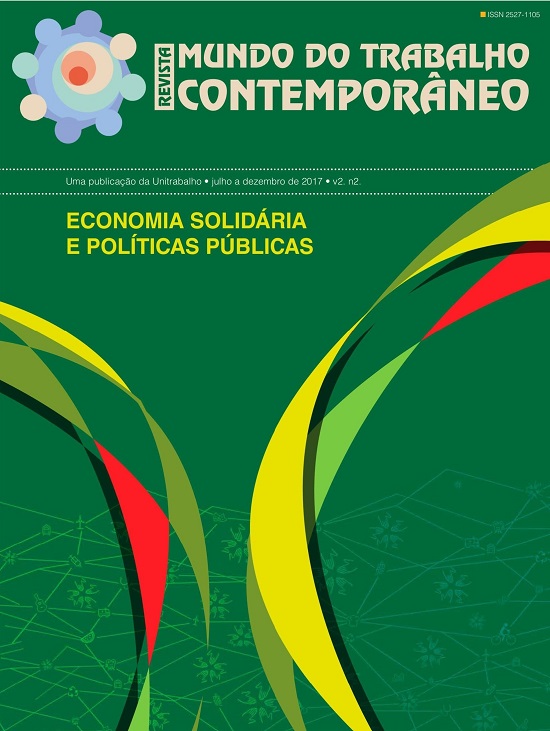Análise do processo de elaboração e proposição da política pública de economia popular solidária: O caso de Mato Grosso
Keywords:
Epistemology;, Public policy;, Solidary socioeconomics.Abstract
The article analyzes the assumptions for elaboration and proposal of the public policy of socioeconomic solidarity in the State of Mato Grosso between the years 2003 and 2014. To achieve this goal, the debate about the theoretical and epistemological foundations that guide the conceptions of knowledge based on the dialectic between the description and interpretation of reality and the dynamics of projection and transformation of the historical context, describing a possible future. For critical understanding, I take by base the theory in the Analysis of Politics that has as reference the description, explanation and prescription of public policies based on the participation of different social actors. In the perspective of the public policy of socio-economic solidarity and in the generation of science and technology for the development of popular groups, I discuss the Theory of Sociotechnical Adequacy. I present the framework of the general conception of the process of elaboration and proposal called a state day that had as its objective the mobilization of actors to elaborate, forward and approve the public policy for solidarity socioeconomics in the State of Mato Grosso. The analysis is limited to the time it starts in 2003 with the implementation of EMESOL at the State University of Mato Grosso, through the construction of the PIESES and the articulation of REMSOL until the holding of public hearings, the proposal and approval of the state law of solidarity economy in the year 2014.
Downloads
References
ARRUDA, M. Humanizar o infra-humano: a formação do ser humano integral: homo evolutivo, práxis e economia solidária. Petrópolis/RJ: Vozes, 2003.
DAGNINO, R. et al. Gestão estratégica da inovação: metodologias para a análise e implementação. Taubaté/SP: Editora Cabral Universitária, 2002.
___________. Neutralidade da ciência e determinismo tecnológico: um debate sobre a tecnociência. Campinas/SP: Editora da Unicamp, 2008
DEMO, P. Participação é conquista. São Paulo: Cortez Editora, 1999.
FREIRE, P. Educação e mudança. Trad. Moacir Gadotti e Lillian Lopes Martin. Rio de Janeiro: Paz e Terra, 1979.
GRAMSCI, A. Os intelectuais e a organização da cultura. Trad. Carlos Nelson Coutinho. Rio de Janeiro: Civilização Brasileira, 1978.
HAM, C.; HILL, M. O processo de elaboração de políticas no estado capitalismo moderno. Trad. Renato Dagnino. Título do Original: The Policy in The Modern Capitalist State. Londres: Harvester Wheatsheaf, 1993.
HERRERA, A. et al. Las nuevas tecnologías y el futuro de América Latina: riesgo e oportunidad. México/DF: Siglo Veintiuno Editores ”“ Editorial de la Universidad de las Naciones Unidas, 1994.
MARTINS, J. de S. A chegada do estranho. São Paulo: Hucitec, 1993.
RIBEIRO, Darcy. O Povo brasileiro: a formação e o sentido do Brasil. São Paulo: Companhia das Letras, 1995.
ROTH-DEUBEL, A.-N. Políticas públicas: formulación, implementación y evalución. Bogotá: Ediciones Aurora, 2006.
SMITH, A. A riqueza das nações: investigação sobre sua natureza e suas causas. Trad. Luiz João Baraúna. São Paulo: Nova Cultural, 1996.
SANTOS, B. de S. A crítica da razão indolente: contra o desperdício da experiência. São Paulo: Cortez, 2000.



